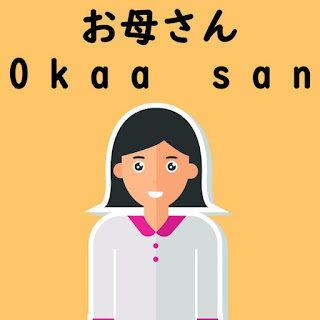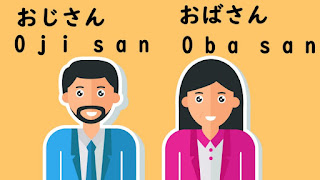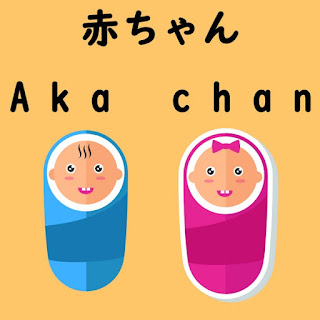Japanese personal pronouns 2
This time, I will explain personal pronouns related to your family.
Parent
This word means parent.
”私の親は、とてもお金持ちです。(わたしの おやは とても おかねもち です。watashi no oya wa totemo okane mochi desu.)”
My parents are very rich.
両親(りょうしん ryou shin)
This word means parents.
"私の両親は東京に住んでいます。(わたしの りょうしんは とうきょうに すんで います watashi no ryoushin wa toukyou ni sunde imasu.)"
My parents live in Tokyo.
Father
父(ちち chichi)
父親(ちちおや chichi oya)
”お父さん(おとうさん otou san)”is the word you use when you call him.
"私はお父さんをとても尊敬しています。(わたしは おとうさんを とても そんけい して います。watashi wa otou san wo totemo sonkei shite imasu.)"
I respect my father very much.
”父(ちち chichi)”or”父親(ちちおや chichi oya)” is the word you use when you talk to someone about him.
"私の父の父親はおじいさんです。(わたしの ちちの ちちおやは おじいさん です。watashi no chichi no chichi oya wa ojii san desu.)"
The father of my father is a grandfather.
Mother
母(はは haha)
母親(ははおや haha oya)
"お母さん(おかあさん okaa san)" is the word you use when you call her.
”私はお母さんのことが大好きです。(わたしは おかあさんの ことが だいすき です。watashi wa okaa san no koto ga dai suki desu.)”
I love my mom.
"母(はは haha)" or "母親(ははおや haha oya)"is the word you use when you talk to someone about her.
"私の母の母親はおばあさんです。(わたしの ははの ははおやは おばあさん です。watashi no haha no haha oya wa obaa san desu.)"
The mother of my mother is a grandmother.
"さん san" is a term added to the end of a word as an honorific title for the other person. There are several Japanese honorifics other than "さん san".
Brother & Sister
Big sister
お姉ちゃん(おねえちゃん onee chan)
お姉ちゃん(おねえちゃん onee chan)
お兄ちゃん(おにいちゃん onii chan)means a brother and the same when you call him or talk to someone about him. The title of honor may be "さん san".
"あなたのお兄ちゃんはとても背が高いですね。(あなたの おにいちゃんは とても せが たかい ですね。anata no onii chan wa totemo se ga takai desu ne.)"
Your big brother is very tall.
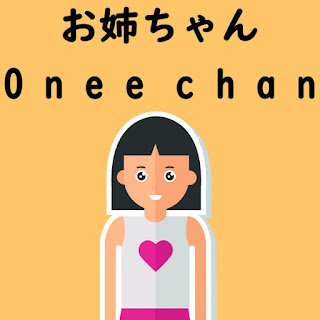 |
| お姉ちゃん Onee chan |
お姉ちゃん(おねえちゃん onee chan) is a sister and the usage is the same as "お兄ちゃん". The title of honor may be "さん san".
"あなたのお姉さんは髪が長いですね。(あなたの おねえさんは かみが ながい ですね。anata no onee san wa kami ga nagai desu ne.)"
Your sister has long hair.
Little Brother & Little Sister
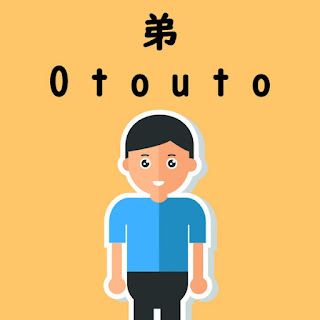 |
| 弟 Otouto |
弟(おとうと otouto)is a younger brother. You use this word when you talk to someone about him. When you call him, you call him by his name, not by this word.
"私には弟が一人います。(わたしには おとうとが ひとり います。watashi niwa otouto ga hitori imasu.)
I have a younger brother.
 |
| 妹 Imouto |
妹(いもうと imouto)is a younger sister.You use this word when you talk to someone about her. When you call her, you cal her by her name, not by this word.
"私には妹が一人います。(わたしには いもうとが ひとり います。watashi niwa imouto ga hitori imasu.)"
As for "お兄ちゃん" and "お姉ちゃん" you can also say this when you explain them to someone.
Big brother
"兄 あに ani"
Big sister
"姉 あね ane"
"兄 あに ani"
Big sister
"姉 あね ane"
"私には兄と姉が一人ずついます。(わたしにはあにとあねがひとりずついます。watashi niha ani to ane ga hitori zutsu imasu.)"
I have one brother and one sister.
I used the title "ちゃん chan" here. "ちゃん chan" is a title of respect you use for someone you are close to.
The terms "お兄ちゃん" and"お姉ちゃん" are also used for people other than your own brother or sister. I mean, it's a man and a woman older than you.
Uncle & Aunt
However, if they are a middle-aged man or woman older than you, their names will change.
"あのおじさんとおばさんは、私のいとこです。(あの おじさんと おばさんは わたしの いとこ です。ano oji san to oba san wa watashi no itoko desu.)"
That uncle and aunt are my cousins.
These are the names you use for middle-aged men and women, regardless of whether they are related to you.
You call older men and women in these terms.
Grandpa & Grandma
"私のおじいさんとおばあさんは今も元気です。(わたしの おじいさんと おばあさんは いまも げんき です。watashi no ojii san to obaa san wa ima mo genki desu.)"
My grandfather and grandmother are still healthy.
The title you use for them may be "ちゃん chan".
Baby
Next is "About babies".
"この赤ちゃんはとてもかわいいですね。(このあかちゃんはとてもかわいいですね。kono aka chan wa totemo kawaii desu ne.)"
This baby is very cute.
Whoever they are, they have the same name. Their title of honor is only "ちゃん chan".
Reference
There are other words used to describe people in Japanese conversational expressions.
This person
この人(このひと kono hito)
That person
あの人(あのひと ano hito)
"この人は私の友達です。でも、あの人は知らない人です。(この ひとは わたしの ともだち です。でも、あのひとは しらない ひと です。kono hito wa watashi no tomodachi desu. demo, ano hito wa shiranai hito desu.)"
"This is my friend. But I don't know that person.
You call someone you don't know and who is close to you "この人".
You call someone you don't know who is farther away from you "あの人".
This guy
こいつ(koitsu)
That guy
あいつ(aitsu)
"私はこいつとあいつのことが大嫌いです。(わたしは こいつと あいつのことが だいきらい です。watashi wa koitsu to aitsu no koto ga dai kirai desu.)"
I hate this guy and that guy.
These are the same people as "this person" or "that person", but they are the names you use for people you despise.



